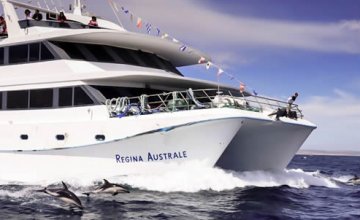The Argentine Sea is home to the southern right whale (Eubalaena australis), one of the largest whales. Between June and December, the Valdés Peninsula and the Golfo Nuevo are the favorite destinations to enjoy whale watching and get to know their journeys. Every year the most characteristic cetacean returns to these coasts of temperate waters, more repaired from the winds, to mate and give birth to their young.
The universe is engrossed with nature in the Golfo Nuevo and the southern right whale, a species protected throughout the world. In Argentina it is a National Natural Monument.
Traditional whale watching
Winter and spring are the seasons when the southern right whale approaches the coasts of Península Valdés, in the province of Chubut. Whale watching in their natural habitat brings visitors closer to the enjoyment of the dances and curiosity of these incredible animals, which remain on the surface for a long time and poke their heads to observe and make contact with humans.

The traditional excursion in semi-rigid boats departs from Puerto Pirámides. Southern Spirit offers whale sailing, a classic ride in the Golfo Nuevo to discover this amazing sanctuary where the friendly behavior of the individuals, with their slow and dancing swimming, monopolizes all eyes. The agency has 20 years of experience in the management of these marine scenarios and promotes this nautical walk, moving a radius of 10 miles from Puerto Pirámides.

During the excursion other animals are observed, such as fur seals, seabirds of the Patagonian coast and dark dolphins.

Underwater sighting
The second option is underwater sighting, with a semi-submersible two-deck vessel, the Yellow Submarine, for passengers who want to have a double experience: the traditional one on the upper deck and the closest one in the underwater cabin, whose windows offer another perspective of whale sailing.

The southern right whale begins its breeding cycle and closes ties with the calves. After this time, the young undertake the annual trip with their mothers to learn about the migratory routes and feeding areas in the open sea.
Fortunately, it is a species in recovery after several centuries of indiscriminate hunting. Halting the advance of the oil industry is vital to conserving the biodiversity of the oceans and protecting marine wildlife.
The guides guarantee a unique experience, taking care that the activity complies with the protocol of good practices for whale watching in their natural habitat.


































